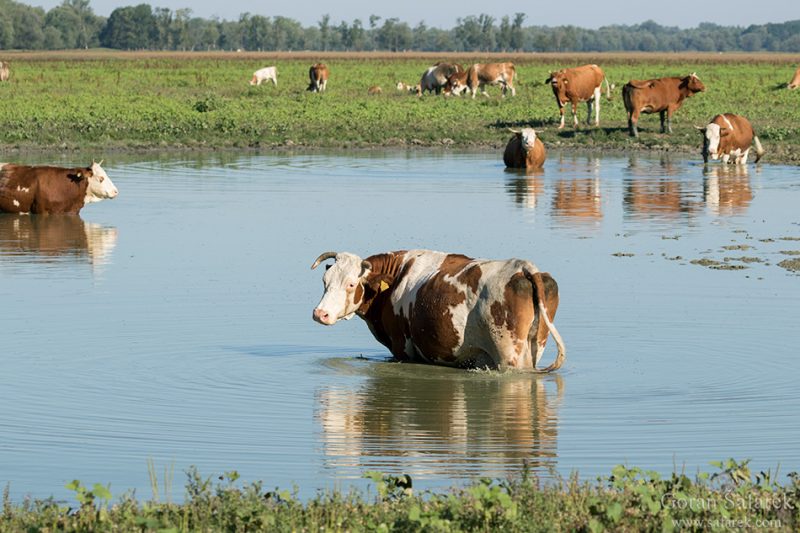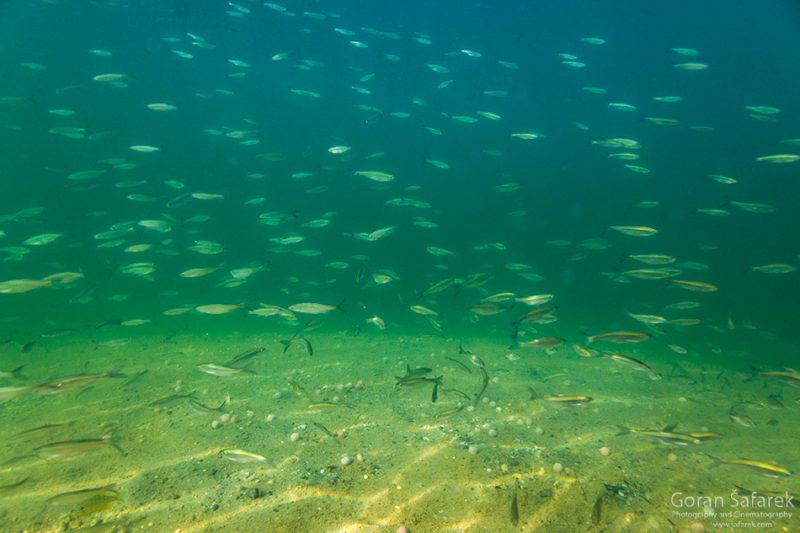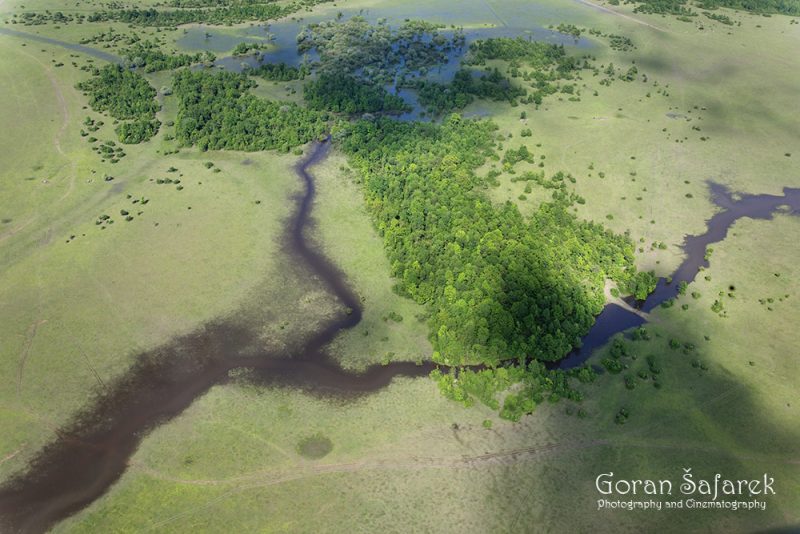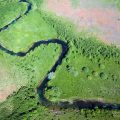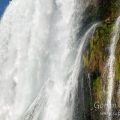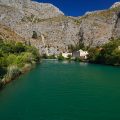The Benefits of Rivers: Vital Ecosystem Services That Support Life
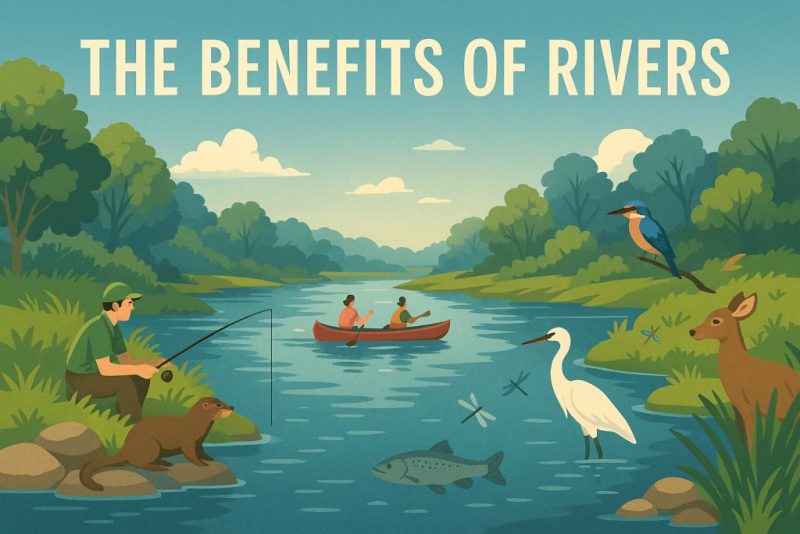
Discover the benefits of rivers—from clean water to climate balance—and why protecting them is vital for life, biodiversity, and our future.
Preserved, natural rivers and streams are far more than scenic landscapes or sources of water for drinking, irrigation, or hydropower. Beyond their conventional uses, rivers quietly provide a wide range of ecological benefits of rivers that are essential for life—but often go unnoticed until they’re gone. These invisible yet powerful contributions are known as ecosystem services.
From regulating climate and purifying water to supporting biodiversity and preventing floods, healthy river systems play a foundational role in maintaining balance in nature. In the European Union alone, the estimated value of these services exceeds 300 billion euros annually. Yet, because they operate silently in the background, they’re often overlooked—until damage occurs and the cost of restoring what we’ve lost becomes painfully clear.
A helpful comparison is the role of bees as pollinators. We don’t always think about their impact—until we face a world without fruits, vegetables, and other crops that rely on insect pollination. Similarly, rivers deliver crucial services we take for granted, and replacing them artificially would be enormously costly, if not impossible.
In this article, we’ll dive into the key benefits of rivers, reveal their hidden ecological services, and explore why protecting them is not just an environmental issue—but a matter of survival.
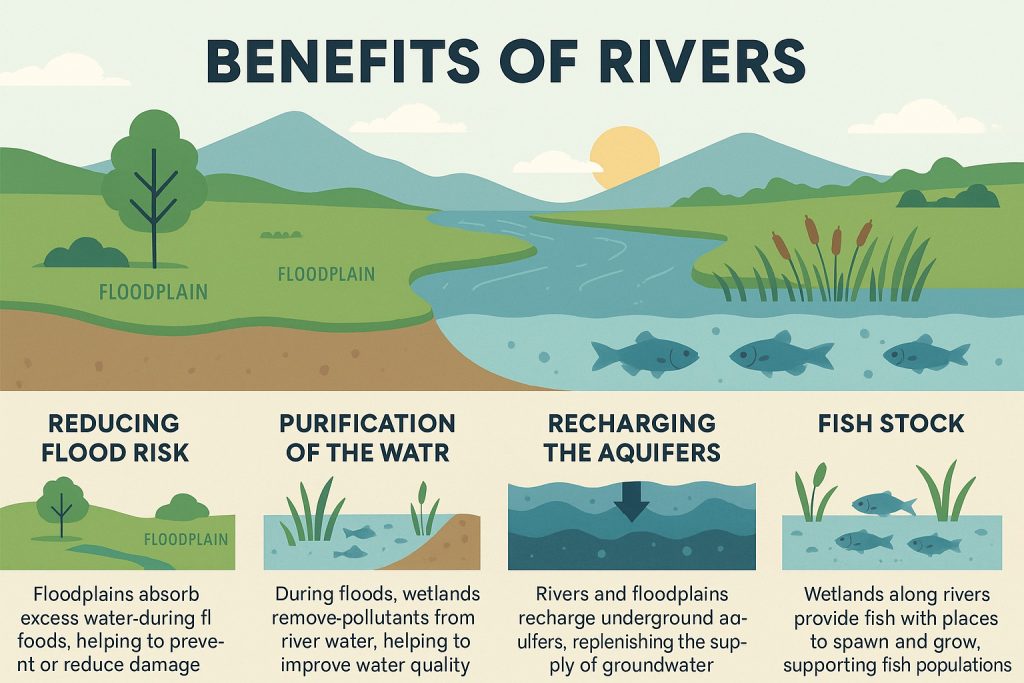
🌊 Reducing the Flood Risk
One of the most powerful but often underestimated benefits of rivers is their natural role in flood regulation. A healthy river system includes a functional floodplain—a dynamic area that not only supports biodiversity but also plays a vital role in hydrology. These natural floodplains act as buffers, absorbing and slowing down excess water during heavy rainfall or snowmelt events.
Wetlands and floodplains are nature’s most effective flood defense systems. They can store vast volumes of overflow water, easing the pressure on riverbanks and preventing devastating floods downstream. In many parts of the world—especially across Europe, North America, and Asia—rivers have been heavily modified with levees, dams, and concrete channels. While these structures were built to protect cities, they often lead to more severe and frequent flooding when the river’s natural floodplain is removed or restricted.
Without room to breathe, rivers become dangerous during extreme weather events. Restoring and preserving natural floodplains is not just about protecting wildlife—it’s a smart, cost-effective strategy for reducing flood risk and safeguarding human communities.
Learn how flooding is a natural phenomenon for almost every river.
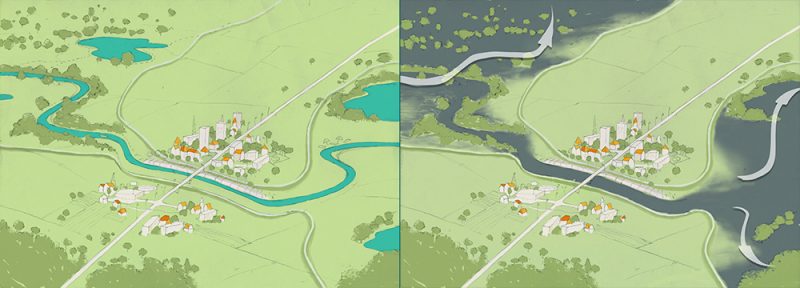
💧 Natural Water Purification
One of the lesser-known yet vital ecosystem services of rivers is their remarkable ability to purify water—especially through their floodplains and wetlands. When rivers overflow during floods, millions of liters of water come into contact with the surrounding wetland soil and vegetation. This natural interaction triggers an incredible self-cleaning process.
Plants and microorganisms in the floodplain absorb nutrients and pollutants from the floodwaters, using them to grow and thrive. At the same time, harmful substances—such as those from industrial runoff, agricultural chemicals, and urban wastewater—are filtered out or broken down in the soil. In this way, floodplains act as living biofilters, removing toxins and reducing pollution before the water continues its journey downstream.
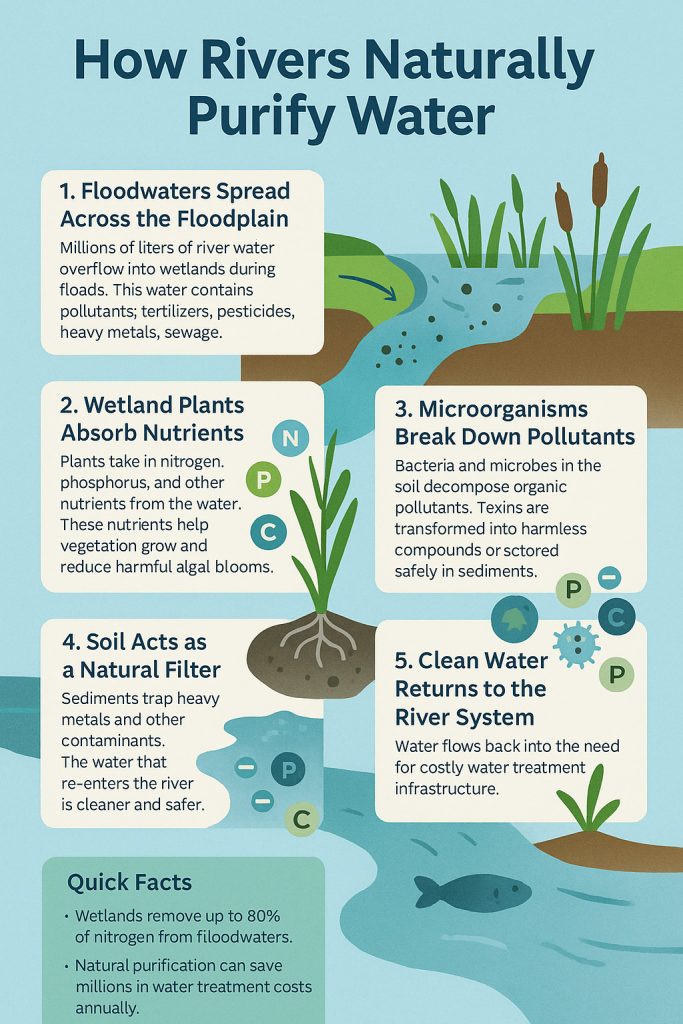
This purification service is not only cost-free but incredibly effective—far more sustainable than artificial water treatment plants alone. Protecting these natural filtration zones is essential for maintaining clean and safe water for both ecosystems and human use.
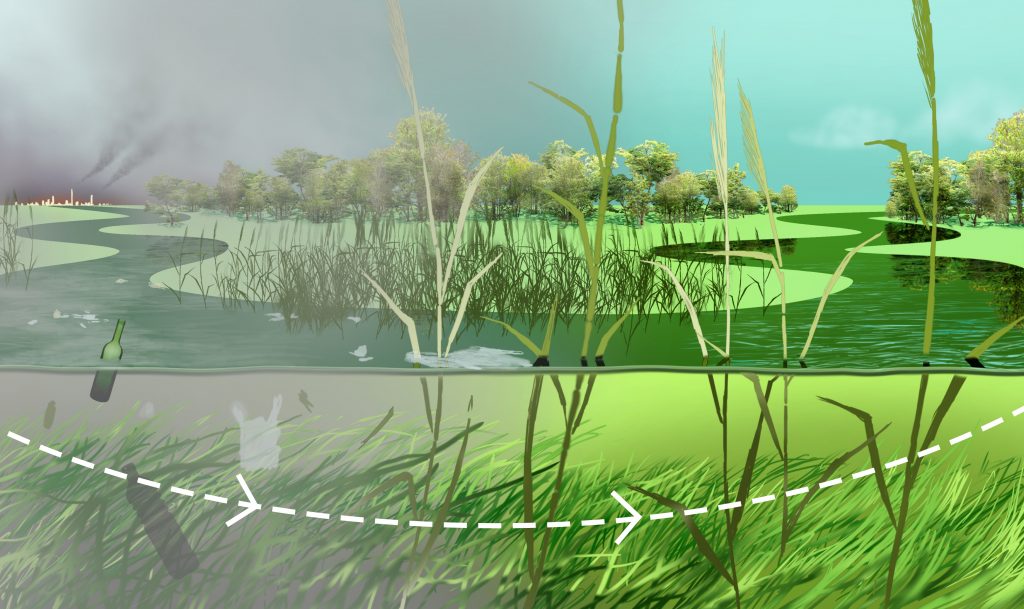
💦 Recharging the Aquifers
Another essential but often overlooked benefit of rivers is their role in replenishing underground water reserves, known as aquifers. When floodwaters spread naturally across floodplains, a portion of that clean, filtered water seeps slowly into the ground, recharging these deep subterranean reservoirs that many communities rely on for drinking water and irrigation.
Floodplains act like giant sponges—soaking up water and allowing it to percolate into the aquifer over time. Without regular flooding, this crucial recharge process is disrupted, leading to long-term water scarcity.
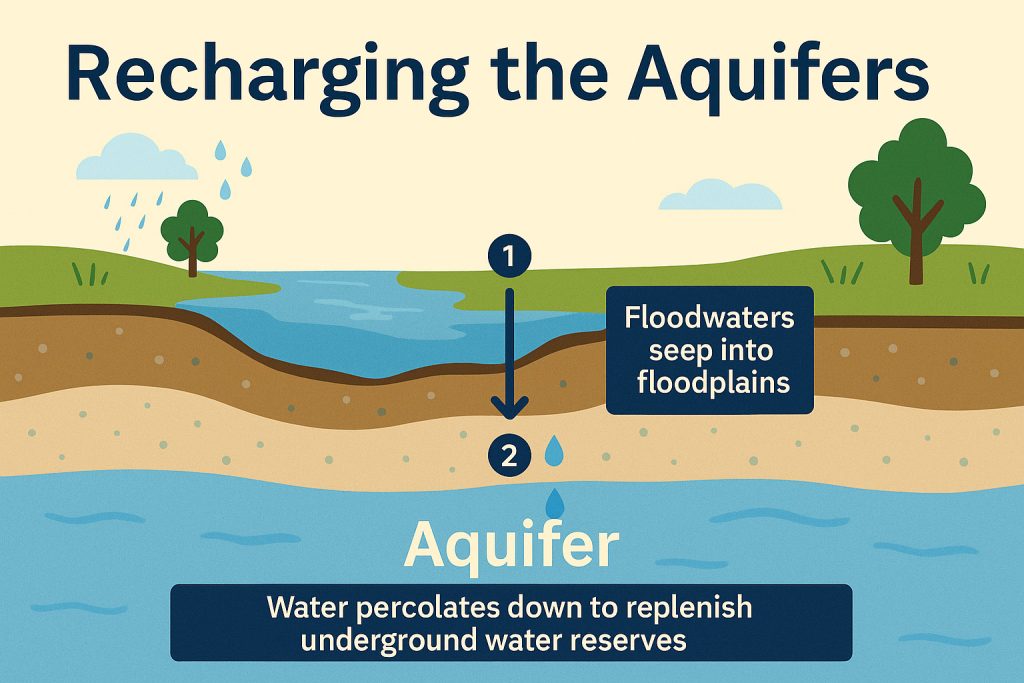
A striking example is found in California, where aquifers have been severely depleted after a century of intensive agriculture and groundwater pumping. Now, scientists and policymakers are turning back to nature—developing innovative plans to intentionally flood agricultural fields and floodplains in winter, mimicking natural processes to restore these critical underground reserves.
Protecting floodplains is not just about ecosystems—it’s about securing future water supplies in the face of climate change and increasing demand.
🐟 Supporting Fish Populations
Healthy rivers and their connected wetlands play a crucial role in maintaining robust fish populations. Species like carp and other freshwater fish migrate from the main river channel into wetlands, oxbows, and sidearms—areas where the water is slower, vegetation is abundant, and conditions are ideal for spawning and egg attachment.
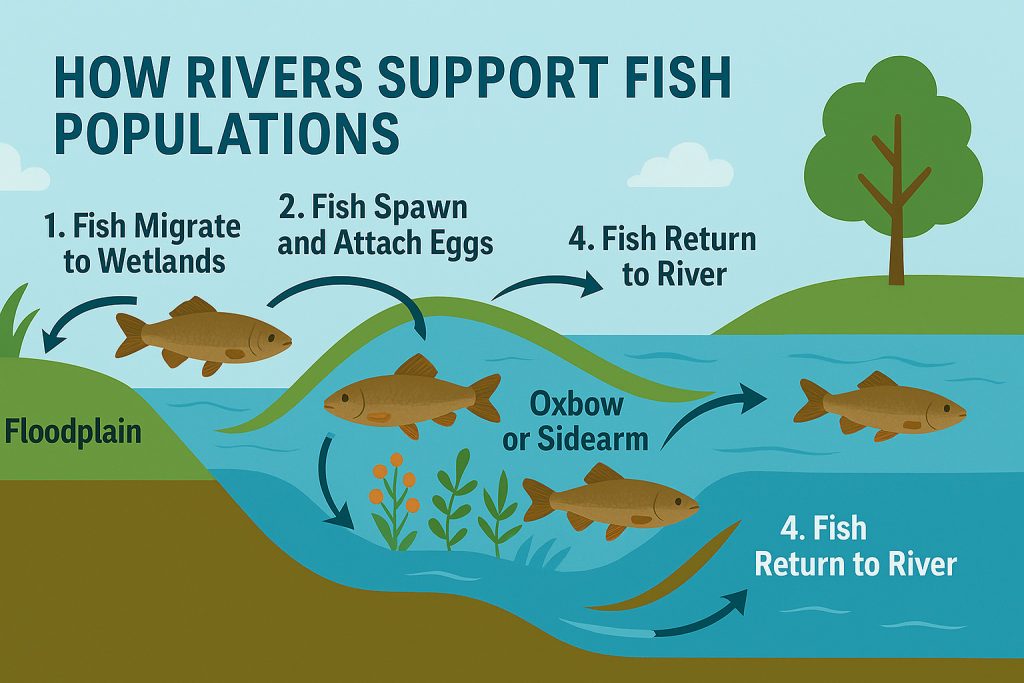
These calmer, nutrient-rich zones serve as natural nurseries, offering young fish shelter and food as they grow. Once matured, the fish return to the main river, supporting not just biodiversity but also sustainable fish stocks that are essential for local fisheries and ecosystems.
Interrupting this natural cycle—by cutting off side channels, draining wetlands, or over-regulating river flow—can severely damage spawning habitats and lead to drastic declines in fish populations. Protecting these breeding grounds is key to healthy aquatic life and resilient ecosystems.
🌱 Fertilizing the Soil
One of the most valuable and time-tested benefits of rivers is their ability to enrich the soil. When rivers overflow into their natural floodplains, they deposit nutrient-rich sediment, renewing the land and making it incredibly fertile for agriculture. These periodic floods act as nature’s own fertilizer, creating some of the most productive farmland in the world.
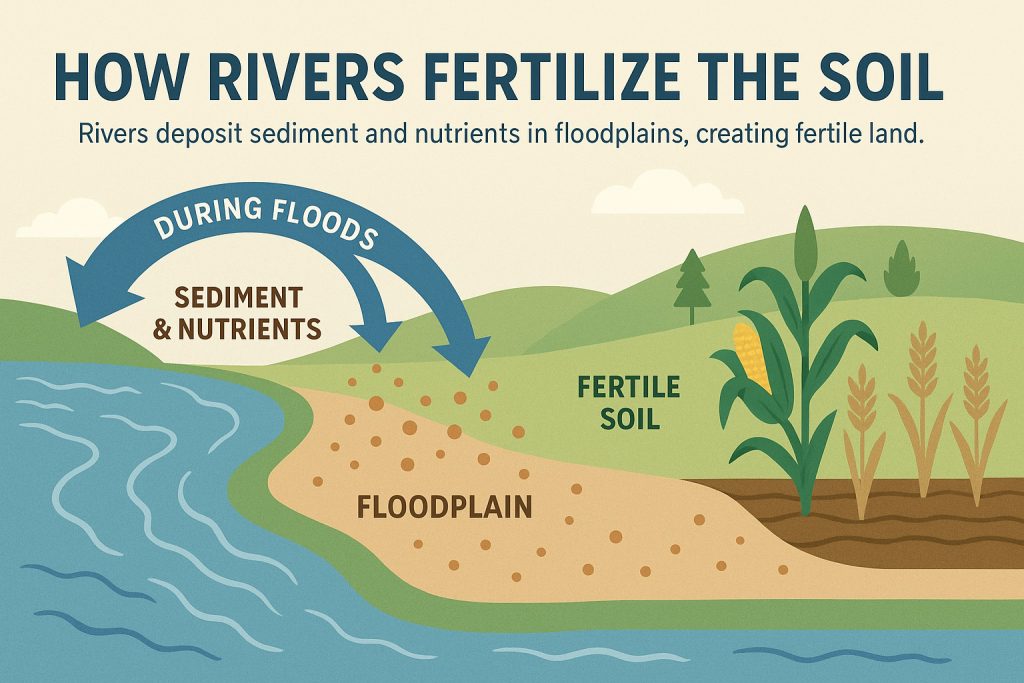
Historically, civilizations thrived along rivers for precisely this reason—just think of the Nile or the Danube. Yet today, modern flood control practices often aim to prevent all flooding, even the small, beneficial ones that help maintain healthy ecosystems and crops. Ironically, by blocking minor floods, we lose their nourishing effects—while increasing the risk of more severe and destructive flooding in the long term.
Embracing natural flooding cycles, rather than fighting them completely, is not only more sustainable—it’s smarter land management.
There is much more!
Rivers provide a vast array of ecosystem services, many of which are often overlooked. Beyond flood control, water purification, aquifer recharge, fish spawning, and soil fertilization, here are additional key ecosystem services provided by rivers:
🌿 Regulating Services
These services help maintain the planet’s balance:
-
Climate Regulation
– River systems and adjacent wetlands store carbon, help regulate temperature, and influence local and regional climate patterns. -
Sediment Transport & Shoreline Stabilization
– Rivers naturally transport sediments, preventing coastal and delta erosion, and helping to shape landscapes like estuaries and deltas. -
Groundwater Regulation
– Beyond recharge, rivers help maintain groundwater pressure and flow, ensuring wells and springs stay active. -
Disease Regulation
– Healthy, flowing rivers help dilute and flush away pollutants and pathogens, reducing the risks of waterborne disease outbreaks.
🌾 Provisioning Services
These are the tangible goods rivers provide:
-
Freshwater Supply
– Rivers are the primary source of freshwater for drinking, agriculture, and industry worldwide. -
Food Supply (Beyond Fish)
– Rivers support the growth of edible plants (e.g. wild rice, aquatic vegetables) and provide materials for foraging communities. -
Biomass and Raw Materials
– Rivers and riparian zones supply timber, reeds, clay, and medicinal plants used by humans for millennia.
🌺 Cultural Services
These connect people with nature emotionally, spiritually, and recreationally:
-
Spiritual and Religious Value
– Many rivers are considered sacred (e.g., the Ganges, the Jordan) and play central roles in rituals and beliefs. -
Recreation and Ecotourism
– Rivers offer spaces for fishing, kayaking, swimming, and birdwatching, fueling local economies and well-being. -
Aesthetic and Inspiration Value
– Flowing rivers and river valleys inspire art, poetry, and storytelling, and increase property and tourism value through their scenic beauty.
🐾 Supporting Services
These form the foundation of all other services:
-
Habitat for Biodiversity
– Rivers, floodplains, and deltas support thousands of species—not just fish, but amphibians, insects, birds, and mammals. -
Nutrient Cycling
– Rivers transport and cycle nutrients between land, water, and oceans, nourishing entire ecosystems along the way. -
Soil Formation
– Over time, rivers contribute to soil development by depositing mineral-rich sediments that build and renew landscapes.
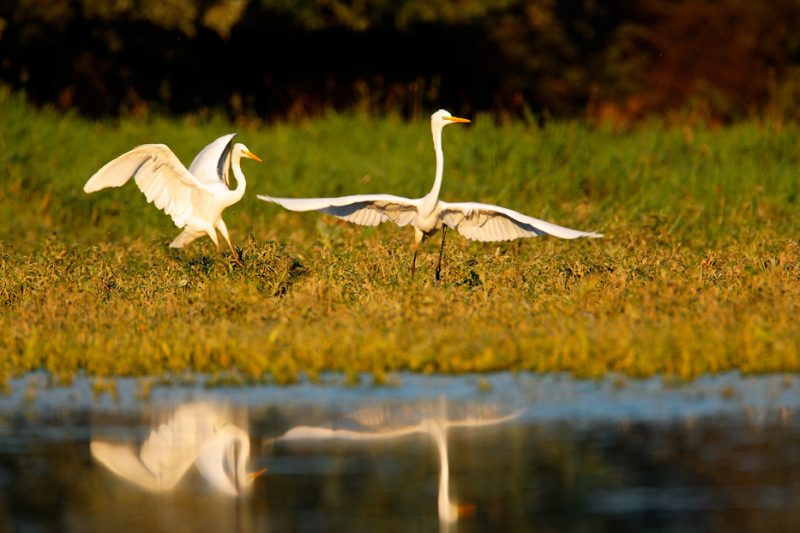
TOURISM
Tourism is not eosysem service by definition, but it is the direct result of the preserved rivers.
🌾 Sustainable Land Use
While essential ecosystem services like natural flood protection and water purification benefit society as a whole, local communities also need ways to use floodplains productively and sustainably. The key is finding a balance between ecological function and economic livelihood.
Practices like extensive, low-impact agriculture offer a viable solution. In floodplain areas enriched by natural sediments, crops can thrive with minimal need for synthetic fertilizers or pesticides—reducing both environmental pollution and risks to human health.
By working with the rhythms of the river instead of against them, we create landscapes that are both resilient and profitable, supporting biodiversity, local economies, and future generations.
